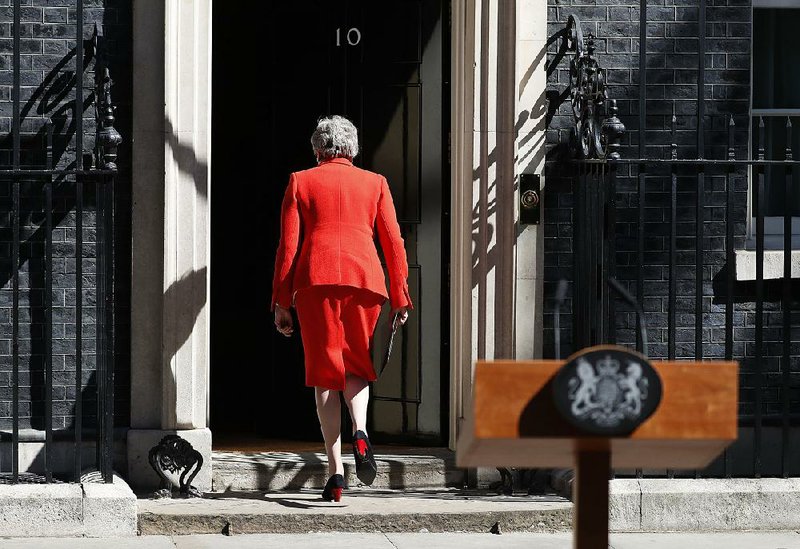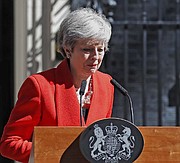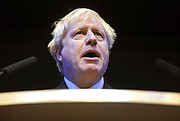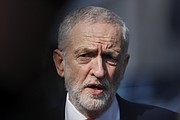LONDON -- Prime Minister Theresa May announced her resignation Friday after three years of trying and failing to pull Britain out of the European Union.
As she stood behind a lectern outside No. 10 Downing St., May said that a different leader was needed to shepherd the split, known as Brexit.
"I have done my best," May said, as close aides and her husband, Philip, looked on, before acknowledging that it was not good enough.
Concluding her remarks, she struggled to contain her emotions and her voice broke as she expressed "enduring gratitude to have had the opportunity to serve the country I love."
May said she would step down as Conservative Party leader on June 7, a few days after President Donald Trump makes an official state visit. She will stay on as a caretaker prime minister until the new leader is chosen, a process the Conservatives aim to complete by late July. The new party leader will become prime minister without the need for a general election.
Brexit has splintered both the Conservatives and the opposition Labor Party since the 2016 referendum that narrowly approved the departure.
Many Conservative lawmakers have grown more hard-line during May's tenure and now support leaving the bloc with no withdrawal deal at all -- a move opposed by a majority in Parliament and one that most analysts warn could result in dire economic consequences.
Brexit, meanwhile, will be on hold until a new leader is chosen. Britain was originally scheduled to leave the European bloc on March 29, but the deadline was extended to Oct. 31 after Parliament refused three times to pass the withdrawal agreement that May had negotiated with European leaders.
The pressure on May reached a breaking point this week as House of Commons Leader Andrea Leadsom quit and several Cabinet colleagues rejected the bill she planned to put before Parliament in a fourth attempt to secure lawmakers' backing for her Brexit blueprint.
In her farewell speech, May defended her record, saying she had "negotiated the terms of our exit and a new relationship with our closest neighbors that protects jobs, our security and our Union."
"I have done everything I can to convince [members of Parliament] to back that deal," she said. "Sadly, I have not been able to do so."
"It is now clear to me that it is in the best interests of the country for a new prime minister to lead that effort," she added.
Multiple contenders are already jockeying to replace her in a contest that will see a new leader chosen by Conservative lawmakers and party members. The early front-runner is Boris Johnson, a former foreign secretary and strong champion of Brexit. Other contenders are likely to include Leadsom, Foreign Secretary Jeremy Hunt and former Brexit Secretary Dominic Raab.
Johnson, whose criticism helped push May out of the door, tweeted: "Thank you for your stoical service to our country and the Conservative Party. It is now time to follow her urgings: to come together and deliver Brexit."
Later Friday, Johnson signaled an unflinching attitude.
"We will leave the EU on Oct. 31, deal or no deal," Johnson told an economic conference. "The way to get a good deal is to prepare for a no deal."
Leadsom said the prime minister's departure was "an illustration of her total commitment to country and duty."
Jeremy Corbyn, the Labor leader, described her resignation as an indictment of a Conservative Party riven for decades by the issue of Britain's membership in the European Union.
He said May had "now accepted what the country has known for months: She cannot govern, and nor can her divided and disintegrating party."
Nigel Farage, the leader of the newly created Brexit Party, said: "It is difficult not to feel for Mrs. May, but politically she misjudged the mood of the country and her party. Two [Conservative] leaders have now gone whose instincts were pro-EU. Either the party learns that lesson or it dies."
To decide the leadership contest, Conservative Party lawmakers will first winnow a list of contenders to two, then hand the choice to the party's roughly 120,000 members.
That will leave the new prime minister only a few months to try to rebuild a deal -- and then decide what to do if that fails. To make matters trickier, the leadership of the European Union is set to change during the coming months.
EU leaders expressed respect for May but stressed they would not renegotiate the Brexit deal.
"We have set out our position on the withdrawal agreement and on the political declaration," said EU spokesman Mina Andreeva.
She said European Commission President Jean-Claude Juncker had great respect for May and would "equally respect and establish working relations" with any new British leader.
German Chancellor Angela Merkel said Germany would continue to "do everything it can to ensure there is a good partnership with Britain, an orderly exit, and then continuing good cooperation."
Trump, who has sometimes differed publicly with May, said he was "feeling badly" for her.
"I like her very much," he said.
May departed with a warning to her successor.
"To succeed, he or she will have to find consensus in Parliament where I have not," she said. "Such a consensus can only be reached if those on all sides of the debate are willing to compromise."
She said it had been "the honor of my life" to serve as Britain's leader, the second woman to hold the job, after Margaret Thatcher.
"The second female prime minister -- but certainly not the last," May said.
Information for this article was contributed by Benjamin Mueller and Stephen Castle of The New York Times; by Jill Lawless, Gregory Katz, Raf Casert and David Rising of The Associated Press; and by Karla Adam, William Booth and Michael Birnbaum of The Washington Post.
A Section on 05/25/2019



